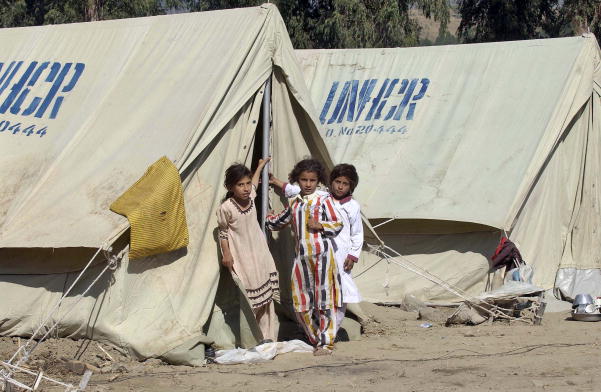
UN Refugee Agency Provides Shelter to Quake Victims (UN Photo/Evan Schneider) available under Creative Commons license on Flickr.
Along with father’s day, June 20th also marked World Refugee Day. The United Nations Refugee Agency (UNHCR) along with its partners ran week-long awareness raising activities world wide centered around this year’s theme: Home. The day was commemorated in different ways from a simulated refugee experience in Kuala Lumpur to free concerts and entertainment in Canada as part of Luminato, an annual festival of arts, culture and creativity.
In Syria, which hosts the largest number of Iraqi refugees, UNHCR chief António Guterres stated: “I appeal to the international community to do more to host refugees.” UN Secretary General Ban Ki-Moon also appealed to the international community reiterating this year’s message while “calling for working with host governments to deliver services.” So, the role of governments in this issue has been emphasized but is there a role for business?
One example of an ongoing program run in partnership with UNHCR is UNIQLO’s Clothing Recycling Initiative. This initiative has been a part of UNIQLO’s Corporate Social Responsibility (CSR) program in Japan since 2001 when they began recycling fleece and expanded to include the rest of their products in 2006. According to the company:
The program is explained by the company:
Since 2006, UNIQLO has had collection drives in March, June and September and the number of collected items has increased significantly:

UNIQLO Recycling Program: Items Collected
Beginning in March of this year, UNIQLO is accepting clothes for recycling year round in Japan. The company also works with Tokyo Metropolitan High Schools and other educational organizations to bring awareness to the All-Product Recycling Initiative.
UNIQLO’s impact on the lives of refugees in 2009:
- September 2009: 150,000 pieces donated to Nepalese refugee camps
- June 2009: 79,000 pieces donated to Pakistani refugee camps
- March 2009: 280,000 pieces donated to Georgian refugee camps
For previous years click here.
According to their 2010 CSR report, UNIQLO collected 7021 items at two high schools in Tokyo after running a high school version of the Initiative. UNIQLO’s goal is to reach 30 million items within 5 years — one for each refugee around the world. The company also plans to expand beyond donated clothing to include technical training for employment.
The impact of UNIQLO’s project cannot be underestimated. Other than protection from the elements, clothing plays an essential role in human dignity, self-esteem and self-expression. Thank you UNIQLO for taking on such an important and sometimes overlooked need for refugees. I hope that this program will expand to include UNIQLO’s international locations soon.
Sources:
UNIQLO CSR REPORT : Section on the Initiative









That’s what I like best about Uniqlo’s men’s clothing. As a eco-friendly individual, I’m glad they make an eco-fashion range that doesn’t lose its great style in the process like so many other competitors do.
Pingback: Bangladeshi workers fight for their rights, will you? | Social Alterations